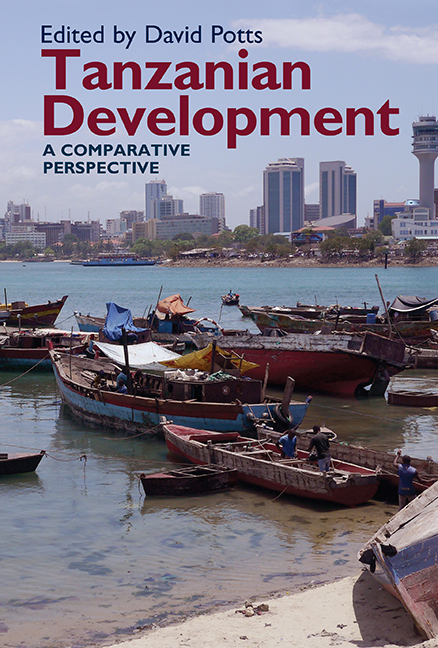Book contents
- Frontmatter
- Contents
- List of Illustrations
- Contributors
- Acknowledgements
- 1 Introduction – Tanzanian Development: A Comparative Perspective
- 2 The Political Economy of Tanzania 1967–2017: Reimagining the State
- 3 Reflections on the Tanzanian Trajectory: Decline and Recovery
- 4 Agricultural Development in Tanzania
- 5 Assets and Poverty Dynamics: The Methodological Challenges of Constructing Longitudinal Surveys in Tanzania
- 6 Contract Farming in Tanzania: Experiences from Tobacco and Sunflower
- 7 ‘We Just Sell Water – That is All We Do’: Two Cases of Small-scale Irrigation in Tanzania
- 8 The Industrial Development of Tanzania in Comparative African Perspective
- 9 Competitiveness in African Manufacturing: Some Evidence from Tanzania
- 10 ‘Good Life Never Comes Like Dreams’: Youth, Poverty and Employment in Arusha
- 11 International Aid to Tanzania – with some comparisons from Ghana and Uganda
- 12 Real Exchange Rate Changes and Export Performance in Tanzania and Ethiopia
- 13 Economic Leakage as a Constraint on Tourism's Effective Contribution to Local Economic Development in Tanzania
- 14 Extractive Industry Revenues and their Expenditure in Local Government Authorities: The Case of the Gold Service Levy in Geita District Council in Tanzania
- 15 Conclusion
- References
- Index
2 - The Political Economy of Tanzania 1967–2017: Reimagining the State
Published online by Cambridge University Press: 24 October 2019
- Frontmatter
- Contents
- List of Illustrations
- Contributors
- Acknowledgements
- 1 Introduction – Tanzanian Development: A Comparative Perspective
- 2 The Political Economy of Tanzania 1967–2017: Reimagining the State
- 3 Reflections on the Tanzanian Trajectory: Decline and Recovery
- 4 Agricultural Development in Tanzania
- 5 Assets and Poverty Dynamics: The Methodological Challenges of Constructing Longitudinal Surveys in Tanzania
- 6 Contract Farming in Tanzania: Experiences from Tobacco and Sunflower
- 7 ‘We Just Sell Water – That is All We Do’: Two Cases of Small-scale Irrigation in Tanzania
- 8 The Industrial Development of Tanzania in Comparative African Perspective
- 9 Competitiveness in African Manufacturing: Some Evidence from Tanzania
- 10 ‘Good Life Never Comes Like Dreams’: Youth, Poverty and Employment in Arusha
- 11 International Aid to Tanzania – with some comparisons from Ghana and Uganda
- 12 Real Exchange Rate Changes and Export Performance in Tanzania and Ethiopia
- 13 Economic Leakage as a Constraint on Tourism's Effective Contribution to Local Economic Development in Tanzania
- 14 Extractive Industry Revenues and their Expenditure in Local Government Authorities: The Case of the Gold Service Levy in Geita District Council in Tanzania
- 15 Conclusion
- References
- Index
Summary
This chapter uses the concept of political economy to structure a brief economic history of Tanzania before reviewing Tanzania's current plans and strategies. A short final section examines some of the challenges that face the present leadership.
Political Economy
The classical economists, notably Adam Smith, David Ricardo and Thomas Malthus, wrote about how wealth was created, and how profit was distributed between classes – landlords, owners of finance, and workers. This they called political economy.
Karl Marx, in Das Kapital Volume 1, turned this into a determinist theory of development. Societies would proceed, from a state of primitive existence, to feudalism, which would give way to capitalism, which would then pave the way for a socialist revolution in which the working class would take over the state. A capitalist economy would grow when manufacturing entrepreneurs, part of the urban elite or bourgeoisie, invest and create new capacity to create goods. Crises of capitalism would occur when the demand or purchasing power for these goods was not sufficient to buy what could be produced. In his later years, however, Marx recognized that the stages were not predetermined, that some feudal, and some ‘Asiatic’, societies would be stable and might innovate and develop, and hence that each society should be studied on its own terms. A path to socialism was far from inevitable (Shanin 1983; Ramirez 2011; Coulson 2014).
However, Marxists in the mainstream tradition stayed with the earlier Marx. Lenin, in The Development of Capitalism in Russia (1899) and Imperialism: The Highest Stage of Capitalism (1917), took determinist theory as given. In the 1950s this approach was applied to third world development in what became known as dependency theory (e.g. Baran 1957; Prebisch 1963; Amin 1977). Colonies were exploited by the capitalist classes of their ruling countries for their raw materials: minerals and agricultural products; and after independence, this exploitation continued through the activities of large multinational companies. The only way to respond to this imperialism (and the neo-colonial imperialism that succeeded it) was for socialist political parties to take over the state, create surpluses, and invest them in factories. Neo-Keynesian economists also argued that these countries had to industrialize, and that, in the short term, the only means to accumulate the surpluses for this was to increase their exports of primary raw materials (Nurkse 1953; Lewis 1955; Rostow 1960).
- Type
- Chapter
- Information
- Tanzanian DevelopmentA Comparative Perspective, pp. 12 - 31Publisher: Boydell & BrewerPrint publication year: 2019



